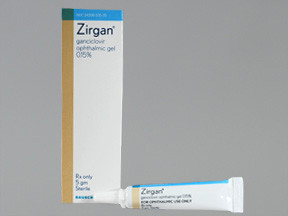GANCICLOVIR - OPHTHALMIC
PHONETIC PRONUNCIATION: (gan-SYE-klo-veer)
COMMON BRAND NAME(S): Zirgan
GENERIC NAME(S): ganciclovir
Uses
USES: Ganciclovir is used to treat herpes infection of the eye. Although ganciclovir stops the growth of the virus, it is not a cure for the herpes infection. Herpes virus continues to live in the body even between outbreaks of infection. However, treating an outbreak may help the sores in the eye to heal faster and lower the risk of complications (such as decreased vision, blindness). Ganciclovir is an anti-viral drug. This medication treats only herpes eye infections. It will not work for other types of eye infections, such as those caused by bacteria. Unnecessary use or misuse of any anti-infective drug can lead to its decreased effectiveness.
How to use GANCICLOVIR - OPHTHALMIC
HOW TO USE: Apply this medication to the affected eye as directed by your doctor, usually 5 times a day (about every 3 hours while awake) until the eye has healed, and then 3 times a day for 7 more days. To apply eye medication, wash your hands first. To avoid contamination, do not touch the dropper tip or let it touch your eye or any other surface. Do not wear contact lenses while you have an eye infection or while using this medication. Sterilize contact lenses according to the manufacturer's directions, and check with your doctor before you begin using them again. Tilt your head back, look upward, and pull down the lower eyelid to make a pouch. Hold the dropper directly over your eye and place one drop into the pouch. Look downward, gently close your eyes, and place one finger at the corner of your eye (near the nose). Apply gentle pressure for 1 to 2 minutes before opening your eyes. This will prevent the medication from draining out. Try not to blink or rub your eye. Repeat these steps for your other eye if so directed. Wait several minutes for your vision to clear before driving or operating machinery. Do not rinse the dropper. Replace the dropper cap after each use. If you are using another kind of eye medication (such as drops or ointments), wait at least 5 minutes between applying each medication. Use eye drops before eye ointments to allow the drops to enter the eye. Use this medication regularly to get the most benefit from it. To help you remember, use it at the same times each day. Continue using it for the full time prescribed. Stopping the medication too early may allow the virus to continue to grow. Tell your doctor if your condition persists or if it worsens (for example, you develop eye pain/itching/swelling).
Side Effects
Precautions
Interactions
Overdose
Images
Reviews
Faq for GANCICLOVIR - OPHTHALMIC
Ganciclovir ophthalmic is used to treat an eye infection called cytomegalovirus (CMV) retinitis in patients with acquired immunodeficiency syndrome (AIDS).
Ganciclovir ophthalmic works by inhibiting the replication of the cytomegalovirus (CMV) in the eye, preventing the progression of CMV retinitis.
Ganciclovir ophthalmic is usually applied as an eye drop. The recommended dose is one drop in the affected eye(s) every 2 hours while awake (up to 9 drops daily) for the first 21 to 42 days, followed by a maintenance dose of one drop every 8 hours while awake (3 drops daily).
Common side effects of ganciclovir ophthalmic include blurred vision, eye irritation or redness, eye pain, increased tearing, and sensitivity to light. Serious side effects may include vision changes, eye swelling, severe eye pain, and signs of an allergic reaction.
Ganciclovir ophthalmic should be used during pregnancy only if clearly needed. It is not known if the medication passes into breast milk, so it is advised to consult a healthcare provider before using it while breastfeeding.
It is important to inform your doctor about all the medications you are taking, including prescription and over-the-counter drugs, as well as any herbal supplements. Certain medications, such as probenecid or other drugs that affect kidney function, may interact with ganciclovir ophthalmic.
The medication usually begins to work within a few days of starting treatment, but it may take several weeks or months to fully control CMV retinitis. It is important to continue using ganciclovir ophthalmic as prescribed, even if symptoms improve.
Ganciclovir ophthalmic does not cure CMV retinitis, but it helps to slow down the progression of the infection and preserve vision. Regular follow-up with an ophthalmologist is necessary to monitor the condition and adjust the treatment if needed.
If you miss a dose, apply it as soon as you remember. However, if it is almost time for the next dose, skip the missed dose and continue with the regular dosing schedule. Do not apply extra drops to make up for a missed dose.
Disclaimer
IMPORTANT: HOW TO USE THIS INFORMATION: This is a summary and does NOT have all possible information about this product. This information does not assure that this product is safe, effective, or appropriate for you. This information is not individual medical advice and does not substitute for the advice of your health care professional. Always ask your health care professional for complete information about this product and your specific health needs.


No Reviews Yet